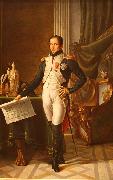La Peinture à l'huile en gros de Chine & Encadre |
|||||||||||

|
|||||||||||
|
|
|
||||||||||||||
|
Jean Baptiste Wicar
Jean-Baptiste Wicar (22 January 1762, Lille - 27 February 1834, Rome) was a French Neoclassical painter and art collector. The son of a carpenter, Wicar studied drawing at the free school in Lille before further honing his talents in the studio of David. The drawings Wicar created of Tableaux, statues, bas-reliefs et camees de la Galerie de Florence et du palais Pitti (Paintings, statues, bas-reliefs and cameos in the Gallery of Florence and the Pitti Palace) were published in Paris in 4 volumes at the Lacombe publishing house from 1789 to 1807. Wicar headed the commission set up by Napoleon I of France to loot artworks from the Austrian Netherlands to enrich museums in France - an initial convoy left Antwerp on 11 August 1794, notably with paintings by Rubens, for the Louvre. Abbeys and castles were systematically emptied of their contents, furniture and works of art. Wicar was also a member of the commission des sciences et des arts on the Italian campaign, in the entourage of Bonaparte. This commission was charged with seizing artworks that could enrich French national museum collections. He finally permanently settled in Rome in 1800 and became a portraitist of European renown. On his death in Rome, Wicar left the major collection of 1,300 drawings he had accumulated over his lifetime to the Societe des Sciences, de leAgriculture et des Arts de Lille. Mostly from the Italian school, but also in some small measure from the northern schools, it held drawings by artists like Raphael, Albrecht Derer, Lucas Cranach, Nicolas Poussin and Jacques-Louis David. |
||||||||||||||
|
|
||||||||||||||
|
||||||||||||||
|
|
||||||||||||||
| Jean Baptiste Wicar
Jean-Baptiste Wicar (22 January 1762, Lille - 27 February 1834, Rome) was a French Neoclassical painter and art collector. The son of a carpenter, Wicar studied drawing at the free school in Lille before further honing his talents in the studio of David. The drawings Wicar created of Tableaux, statues, bas-reliefs et camees de la Galerie de Florence et du palais Pitti (Paintings, statues, bas-reliefs and cameos in the Gallery of Florence and the Pitti Palace) were published in Paris in 4 volumes at the Lacombe publishing house from 1789 to 1807. Wicar headed the commission set up by Napoleon I of France to loot artworks from the Austrian Netherlands to enrich museums in France - an initial convoy left Antwerp on 11 August 1794, notably with paintings by Rubens, for the Louvre. Abbeys and castles were systematically emptied of their contents, furniture and works of art. Wicar was also a member of the commission des sciences et des arts on the Italian campaign, in the entourage of Bonaparte. This commission was charged with seizing artworks that could enrich French national museum collections. He finally permanently settled in Rome in 1800 and became a portraitist of European renown. On his death in Rome, Wicar left the major collection of 1,300 drawings he had accumulated over his lifetime to the Societe des Sciences, de leAgriculture et des Arts de Lille. Mostly from the Italian school, but also in some small measure from the northern schools, it held drawings by artists like Raphael, Albrecht Derer, Lucas Cranach, Nicolas Poussin and Jacques-Louis David. Portrait_of_Joseph_Bonaparte 1808(1808) Medium Oil on canvas Dimensions 240 x 152 cm (94.5 x 59.8 in) cyf 1808(1808) Medium Oil on canvas Dimensions 240 x 152 cm (94.5 x 59.8 in) cyf |
||||||||||||||
|
Related Paintings to Jean Baptiste Wicar :. |
||||||||||||||
|
|
||||||||||||||
|
|
||||||||||||||
|
CONTACTER DES Etats-Unis |







